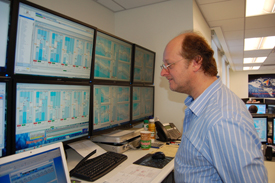|
How to be a Trader: Getting good information,
Being a Trader, & Tax Planning
Getting good information
Getting good information is important for a swing trader and sometimes a little helpful as a day trader. In day
trading you trade what you see, not what you think it should do based on something you read.
Swing traders use good information to reduce risk and improve results on winning trades. Finviz.com,
realmoney.com, seekingalpha.com, and Yahoo finance's Market Overview are good places to get market
information. I also like to watch CNBC's Fast Money show. When you hold a long position overnight
you want to hold companies that are well run and tend to generate good news flow. You can't predict the
future but with top notch companies the unexpected news will most likely be good news.
|

|
For the same reason you should short companies that seem to be good at creating bad news around themselves. You
can also short an index of stocks in a troubled market sector as a hedge against long positions elsewhere.
Always remember not to fight the trend, even if it contradicts the news. For example: On Tuesday the weekly new
claims for unemployment number is worse than expected. Should you short the market on that news alone? Probably not.
Look for the reaction to the news. Perhaps the "whisper number" was much worse and the market could do a relief
rally. Watch for the reaction to the news. Do you have a market that is a "glass half empty" market or a "glass
half full" market? Markets that take disappointing news well are likely to rally.
Tax Planning
I am not an accountant but I will warn you about a few tax rules that you need to be aware of:
The Wash Sale Rule needs to understood for your tax planning. If you sell a security at a loss and buy it back
within 30 days then the loss is carried back into the new trade. You cannot deduct it from your taxes until the
follow-on trade is closed out (and you don't buy it back within 30 days). This does not apply to gains, only
losses. If you want to take a trade as a loss on your taxes you need to stay away from that stock, or an option
on that stock, for 30 days.
The second problem is the limit on carrying over more than $3,000 in trading losses from year to year. To avoid
that you need your accountant to get you the status of a "Mark-to-Market Trader". You will want to deduct your
investment in computers and your paid subscriptions but you will be limited unless you file to have the status
of a "Mark-to-Market Trader". To do that you need to spend a lot of time trading and it is better if you don't
have a full time job. If you have a full time job then you should trade pretty much every day around your work
schedule. As a trader you can deduct every expense on your schedule C and more than $3,000 in losses. Otherwise
you will be forced to use Schedule A and you can only deduct that part that exceeds 2% of your adjusted gross
income. For more information, see IRS Revenue Procedure 99-17 in Internal Revenue Bulletin 99-7
Some Final Trading Principles
From MarketPirates.net:
- It is easier to make up lost opportunities than lost money. Don't be in a rush.
- Maintain you time frame. Don't jump in and out like a day trader if you are a swing trader. If you are a
day trader than don't hold positions overnight. The natural tendency is to push time frames lower and lower.
Higher time frames (like Swing and Position Trading) capture more of the total move.
- Do not become attached to the stock of any company. Companies have interesting stories that can can draw
fans. Trading is a short term relationship -keep it that way.
- Do not enter a trade without an exit criteria.
- Always follow your exit criteria.
- Trade the market you've got, not the market you want.
- Trade what you see, not your opinions. Fade (trade against) every opinion, but follow the market.
- Don't be too negative. The really smart guys are always ready with very well reasoned negative opinions.
The market is ruled by supply and demand, not logic and reason.
- Markets can be overbought for really long periods of time. Don't get sucked into the overbought camp
just because the market is too overbought.
- Excesses in one direction will lead to an opposite excess in the other direction.
- There are no new eras -- excesses are never permanent.
- Exponential rising and falling markets usually go further than you think.
- When all the experts and forecasts agree, something else is going to happen.
- The trade that falls behind is left behind. Never enter a trade without an exit criterion. Never add to
a losing trade. Always follow your exit criteria (see #5).
|